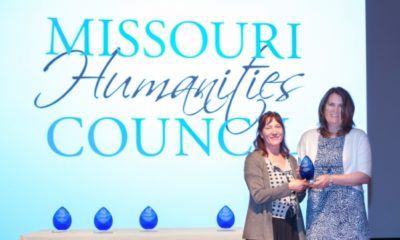Excellence in writing, teaching, research and service prized
* “We all need to find out who we are and how we fit into the world.”
These words, gracing the cover of the Missouri Humanities Council awards program, neatly summed up the erudite search for self-discovery by this year’s MHC honorees. Among them was Diane Mutti Burke, University of Missouri-Kansas City associate professor of History. For her writings about the history of slavery and the Civil War in Missouri, Mutti Burke was recognized with the 2015 Award for Distinguished Literary Achievement.
Honorees and their guests gathered at the National World War I Museum and Memorial, where featured speaker Tom Bloch, former CEO of H & R Block, told the group what it was like to start a charter school designed to help children get the most from their education. The first lesson he learned was a tough one – school is too late. Helping them learn to learn by giving kids the basics must come earlier.
Next came the awards, celebrating Missouri residents who have made exceptional contributions to our understanding of the history and culture of the state and its people. Awards are given for Exemplary Community Achievement (Thad Beeler, H. Dwight Weaver, John McClure Robinson III), Excellence in Education (Thomas M. Bloch), and Mutti Burke’s category, Distinguished Literary Achievement, shared with William Least Heat-Moon.
Because most people view slavery through a national lens, Mutti Burke wanted to provide a close-up view of the personal experiences of those who lived it. Her books, “On Slavery’s Border” (2010) and “Bleeding Kansas, Bleeding Missouri” (2013), do just that. In her writing and the essay collection she edited, Mutti Burke imparts a sense of what slavery, the violent Civil War experience, and post-war race relations were like for the people of this region, a history she describes as both intriguing and problematic.
Why the history of Missouri slavery? Mutti Burke thought the time was right; after all, the last comprehensive book written about the history of slavery in Missouri had been published in 1914. She wanted to make a thorough examination of how the institution of slavery differed from place to place, if at all.
Her book, “On Slavery’s Border,” explores in detail the effects of slavery on family and community life; how people related to each other; how people lived; and what, if any, freedom of movement slaves might have had.
Her research took her to several places where reliable primary sources are kept. The State Historical Society of Missouri Research Center, Columbia, home to the largest collection of documents about antebellum Missouri, proved to be invaluable. She also found primary source materials and historical narratives at the Missouri History Museum in St. Louis, the Jackson County Historical Society in Independence, and the National Archives and Records Center in Washington, DC.
As part of their Union Army pension claims, widows asked friends and relations to provide depositions in order to testify to the validity of their relationship to the deceased soldier, since their marriages had no legal standing during slavery; these documents were extremely helpful in learning about the family and community lives of Missouri slaves. Some slaveholders also kept meticulous records, which gave a graphic picture of the practice of slavery. A diary kept by Missouri slaveholder Paulina Stratton reveals the often-contentious relations that existed between owners and slaves, for example. But some of the best sources for information about Missouri slavery are the interviews of former slaves that were conducted by Works Progress Administration employees during the Great Depression.
In the end, Mutti Burke found that although the work routine often was not as demanding and the conditions of life were in some cases better on Missouri farms than on Deep South plantations, slavery in Missouri could be as “cruel and exploitative as anywhere in the South.”
Mutti Burke believes that her teaching, research and service gelled at just the right moment to attract the attention of the Missouri Humanities Council. Her other book, published in 2013 in the middle of the Civil War Sesquicentennial, also drew great praise. It is an edited collection of articles about the Civil War along the Missouri-Kansas border that resulted from a major conference held at the Kansas City Public Library in 2011. Mutti Burke and her co-editor, Jonathan Earle, organized the conference.
In addition, in her role as the Director of the Center for Midwestern Studies at UMKC, she promotes the history and culture of this region, sharing her resources and passion for history with students and teachers from elementary through high school, as well as with public audiences.
For four years, the National Endowment for the Humanities has funded Mutti Burke’s Landmarks of American History and Culture Workshop called “Crossroads of Conflict: Contested Visions of Freedom and the Missouri/Kansas Border Wars.” The grant provides funding for the Center to host two week-long seminars that bring teachers from across the country to UMKC to learn about this region’s rich Civil War era history.
Mutti Burke finds that one of the most rewarding aspects of her work is seeing students pursue historical interests of their own, following a growing curiosity that began in one of her classes on the Civil War, the American South, the Missouri-Kansas Border Wars, or U.S. Women’s History.
Whenever an opportunity presents itself, in her research, teaching, and public outreach, Mutti Burke strives to bring the humanities to a larger audience.
“I have spent my professional career exploring the intriguing, but sometimes problematic, history of this region,” she said. “I believe that it is essential to gain a fuller understanding of our past in order to tackle the many challenging issues that we face today.”
*The Heart of the Matter, American Academy of Arts and Sciences video, narrated by John Lithgow.

